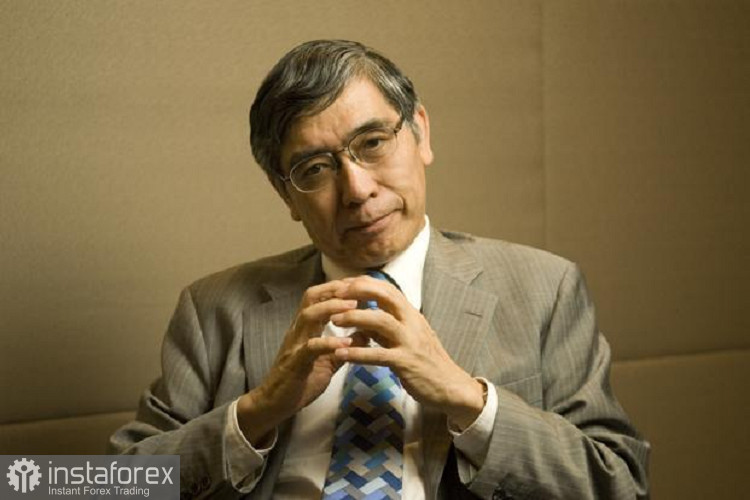The markets are deluded in the mad hope that there is a possibility of adjusting the bank's policy on controlling the yield curve (YCC) in the future. The reason was the words of Bank of Japan Governor Haruhiko Kuroda that this is a likely scenario if inflation continues to grow.
JPYUSD: Is the era of ultra-low rates coming to an end?
However, in my opinion, it is much more important that he sees no reason to change interest rates, he admitted at a meeting of parliament, again emphasizing the importance of maintaining a super-loose monetary policy.
The BOJ remains an exception to the global wave of central bank tightening as it focuses on rebuilding a fragile economy with aggressive stimulus.
With the markets in a persistent bearish trend, this leads me to believe that his words are just diplomatic ripples in the water.
Thus, Kuroda stressed that if Japan sees the prospect of inflation reaching 2%, accompanied by an increase in wages, then, of course, an adjustment in monetary policy will be required. Such indicators in the current and next year are absolutely unrealistic, which means that the old financial wolf is simply leading us by the nose, leaving room for maneuvers in the future.
Under the YCC, the BOJ is aiming for short-term interest rates at -0.1% and also near zero 10-year bond yields as part of efforts to sustain inflation to a 2% target.
In the meantime, the BOJ's relentless defense of the 10-year yield cap has led to a significant distortion in the shape of the yield curve, which has come under upward pressure from rising global interest rates. The gap was palpable.
We note that Japan's core consumer inflation accelerated to a new eight-year high of 3.0% in September, while the yen's fall to a 32-year low is pushing up the cost of imports.
Will such a situation cast doubt on the central bank's resolve to maintain its ultra-loose policy?
To begin with, rising inflationary pressures were the focus of the BOJ's September interest rate hike. Some board members specifically pointed out that corporate pricing behavior could change as more companies raise prices. Obviously, they are unhappy with Kuroda's course, and are trying to push Japan to follow the US Federal Reserve.
In their usual over-polite manner, the members of the board present at the meeting spoke one by one in favor of the BOJ announcing a change of course "at the right time." Agree, this is not a high pressure that Kuroda could withstand.
There are also a huge number of people all over Japan who support the opinion of the Ministry of Finance and are hungry for higher rates.
For example, former BOJ board member Makoto Sakurai, who is a close associate of Kuroda, said the central bank may adjust its yield targets next year if the economy maintains robust growth.
Echoing his associate, Sakurai believes that if Japan can achieve economic growth of around 1.5-2% next year, the BOJ could make small adjustments to control the yield curve. This is an extremely streamlined formulation, and I see no reason to change the policy when sustainable indicators are achieved.
Still, Kuroda's words at the briefing were taken as a dove signal. Hardly a warm hint from the lips of Kuroda himself was taken for a steadfast promise. So it is likely to support market expectations for a change in the central bank's ultra-low interest rates when its second five-year term ends next April.
In addition, the words of the head of the BOJ led to a sharp decline in the yen, which later prompted the government to intervene in the foreign exchange market to support the yen. The currency weakened sharply against the dollar as markets focused on the discrepancy between the BOJ's ultra-soft policy and US interest rate hikes.
This only confirms the idea that traders, often wishful thinking, are becoming disillusioned with the markets in the future. Whereas you always need to look at the background of the process, evaluating it from many positions. In this situation, the human factor played, although there are too few grounds for this. Kuroda is clearly trying to sweep the dollar from the first place, and so far does not intend to retreat from his idea.






















